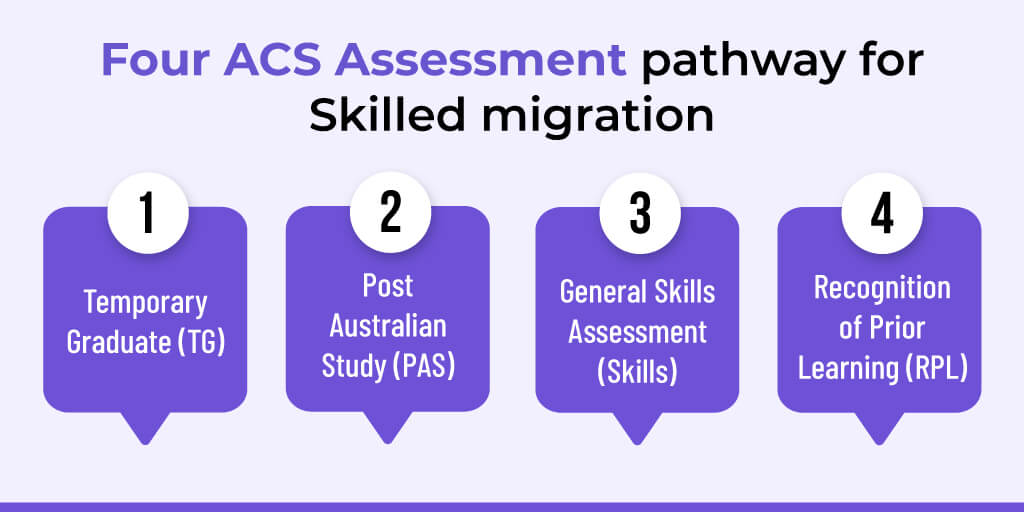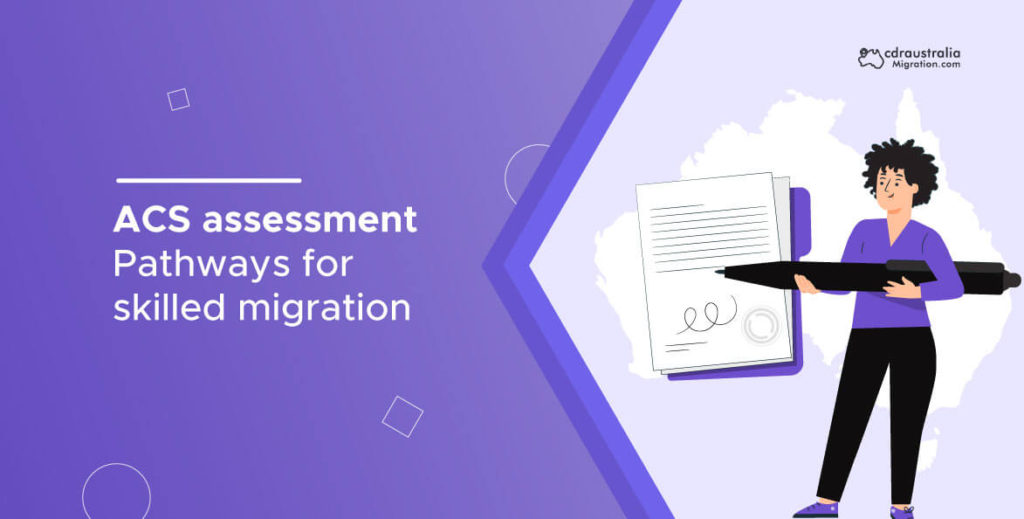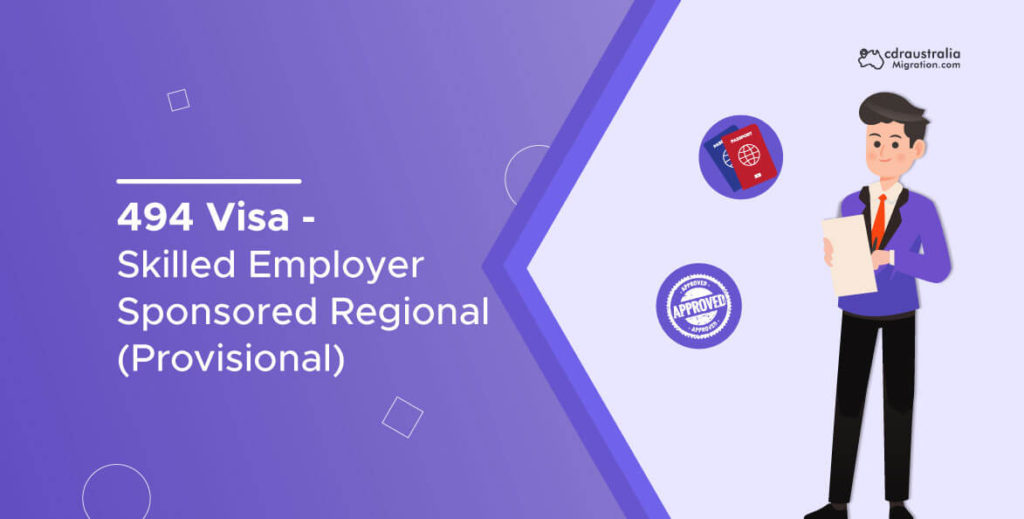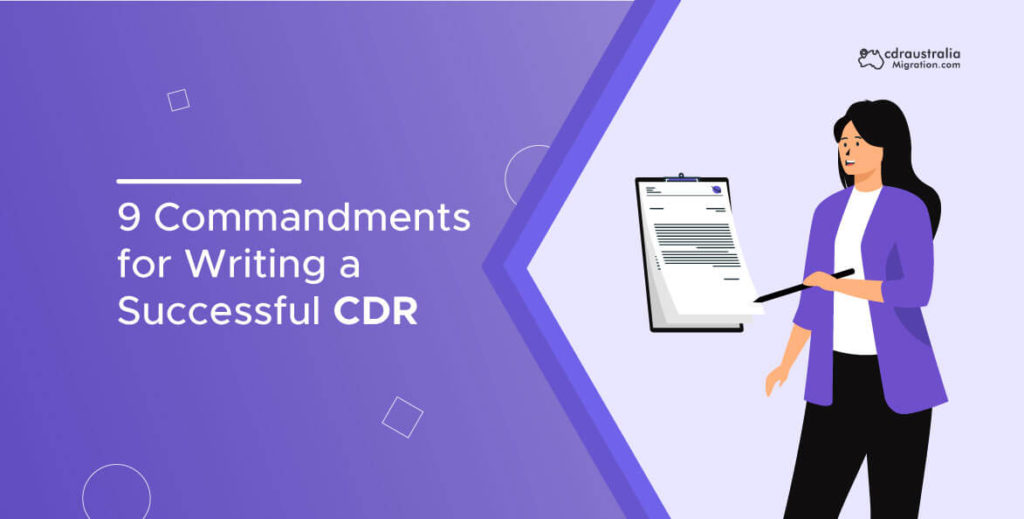Australian Computer Society is the primary body in charge of ICT professionals who wish to migrate to Australia as skilled workers. The major task of ACS is to assess potential international and ICT experts applicants. They make sure that candidates meet the requirements of the relevant assessing authority for work in Australia’s chosen occupation.

Four ACS assessment pathways for skilled migration
1. Temporary Graduate (TG) – only applicable for Australian Bachelor degree holders or higher
Graduates who have completed an Australian Bachelor’s degree or higher are eligible for the Temporary Graduate pathway. This is a skills evaluation for qualifications only, and it can only be used to apply for a subclass 485 visa. For particular 485 visa information, please contact the Department of Home Affairs.
- A Temporary Graduate pathway is only applicable to nominated occupations that appear on the subclass 485 Medium and Long-Term Strategic Skills List (MLTSSL).
- To meet the eligibility criteria, you must have finished an Australian bachelor’s degree or higher at an Australian educational institution with a major in ICT that is closely related to the nominated occupation (ANZSCO).
2. Post-Australian Study (PAS) – only applicable for Australian Bachelor degree holders or higher
The Post Australian Study pathway is for graduates with a Bachelor’s degree or higher from Australia who want a skill evaluation for migration purposes in general. A relevant ICT background or completion of an ACS Professional Year program is required. Please contact the Department of Home Affairs for visa information.
For an acceptable skills assessment, you will need an Australian Bachelor’s degree or higher with a major in ICT that is closely relevant to the nominated occupation (ANZSCO), as well as one of the following requirements:
- 1 year of relevant work experience accomplished after the qualifying Australian degree was completed, or
- Completion of an ACS Professional Year Program.
3. Skills Assessment (Skills)
This application pathway is utilized for tertiary ICT credentials and jobs in the general skill assessment category.
Criteria for applicability
Qualifications with an ICT major
- Applicants require two years of work experience in the related field that is accomplished in the past ten years or four years completed at any time if your degree is an ICT major and is directly connected to your employment.
- Applicants from the ICT field who do not have employment-related to their field must have four years of work experience. The work experience must be completed at any time to fulfill the criteria.
Qualification with ICT Minor
- Applicants require five years of related work experience accomplished in the last ten years or six years of work experience completed at any time if the degree is an ICT minor and is directly applicable to your job.
- Applicants will require six years of related work experience at any time to fulfill the criteria if their degree is an ICT minor that is not closely connected to the employment.
AQF Diploma or vendor certification equivalent qualification
- To fulfill the criterion for ICT-related AQF degrees or vendor certifications, you must have completed five years of related job experience in the previous ten years or six years of work experience at any time.
4. Recognition of Prior Learning (RPL)
Applicants who have tertiary qualifications with little or no ICT content, or who do not have any recognized tertiary qualifications, should use the RPL application process.
- To meet the suitability criteria, you’ll need 6 years of relevant work experience completed at any point in your previous work history, as well as a suitable Recognition of Prior Learning (RPL) application if your qualification is an AQF Diploma or higher with insufficient ICT content.
- To meet the eligibility criteria if you do not have a recognized tertiary educational qualification, you will need 8 years of relevant work experience and an acceptable Recognition of Prior Learning (RPL) application.
Within an RPL application, you must demonstrate how you gained your ICT knowledge and submit two project reports. Instructions for completing the ACS Recognition of Prior Learning Form RPL.
Conclusion
CDRAustraliaMigration has a group of specialists and professionals who are working with Engineers Australia’s requirements and criteria. We provide EA-approved CDR Reports, RPL reports, and KA02 reports, as well as 100% plagiarism-free work, on-time delivery, and 24/7 assistance. Because the CDR Report is frequently rejected owing to numerous inaccuracies, you must double-check every item of information in it. And you’re not even aware of any errors. A review of your CDR Report protects you against long-term loss and assists you in transferring to your desired location. You can also get a free CDR Sample upon request for reference purposes.



